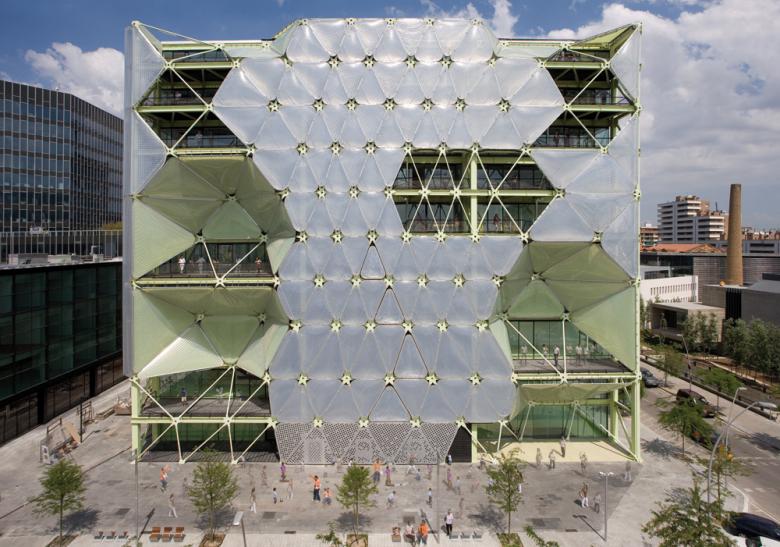Media-TIC
7. November 2011
Cloud 9's office building for the new 22@ district has won the top prize at this year's World Architecture Festival.
(Photo: Luis Ros - Cloud 9)
Today, in the information age, architecture is a technology platform that consists of computer system connections and new materials. This project has been commissioned by The Consortium of the Zona Franca CZFB and 22@ of Barcelona.
(Photo: Luis Ros - Cloud 9)
22@ is an experimental district with a powerful, distributed and accessible energy load. Part of the Districlima network, where new business values are intangible. We were extremely interested in this digital city model based on TIC (information and communication technology), with the idea of a city where what matters is knowledge, added value and patents, in short, where the objective is for your architecture to be in sync with your own values. The building volume forms a cube of 44m x 44m x 37.82m high; the site is 3,572.45 m2 in which the basement occupies the entire area, while above ground the occupation is 54.20%. In total, the Media-TIC has 16,000 m2 above ground and two floors below ground (7100 m2) with capacity for 200 parking spaces.
(Photo: José Miguel Hernandez - Cloud 9)
The building is divided so that the upper floors (from eighth to fourth) are rented for big companies, the second and third floor have small spaces for emergent companies and the first floor with the Cibernariun and an auditorium offers a course program open to all city residents.The ground floor does not have pillars; public space invades the building with 36m x 40m of free space. The building lobby can host exhibitions, workshops, events…
(Photo: José Miguel Hernandez - Cloud 9)
Our construction is built from the top and moves downwards, becoming transparent, anti-gravitational, and almost liquid at the bottom. Thus, its impact on the street is minimal, about 8% mass with respect to the 1500 m2 floor surface area.
Unlike most buildings, which consume huge amounts of energy, the Media-TIC is designed to be a great generator and optimizes energy use.
SIMULATION ENERGY: Thanks to the energy simulation of the building the demands of heat and cold are adjusted accordingly minimizing the dimensioning of installations.
ENCLOSED BUILDING: The façade, made of inflatable ETFE cushions oriented south, acts as a variable sunscreen, opening in winter to gain solar energy, and closing in summer to protect and shade. In the south west façade, Nitrogen based fog is introduced in the cushions, that by increasing its particles produces greater opacity, thereby protecting users.
MONITORING: Both the façades and offices have been equipped with multiple temperature sensors, humidity or pressure that collect exterior information to adjust interior conditions.
Media-TIC targets and achieves:
1-20% CO2 reduction due to the use of District Cooling, clean energy.
2-10% CO2 reduction due to the photovoltaic roof.
3-55% CO2 reduction due to the dynamic ETFE sun filters.
4-10% CO2 reduction due to energy efficiency related to smart sensors.
Total 95% CO2 reduction, the Media-TIC is a NET building almost a net zero building.
Cloud 9
Media-TIC
2011
Barcelona
Architects
Cloud 9
Barcelona
All winners 2011
Related articles
-
Spotlight on Italy
on 5/16/18
-
Bologna Shoah Memorial
on 7/20/15



